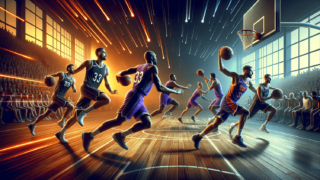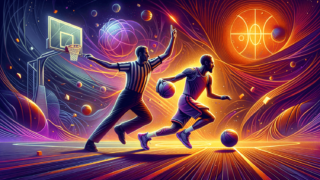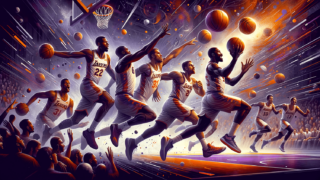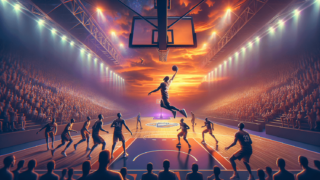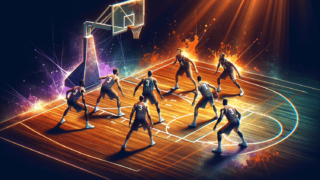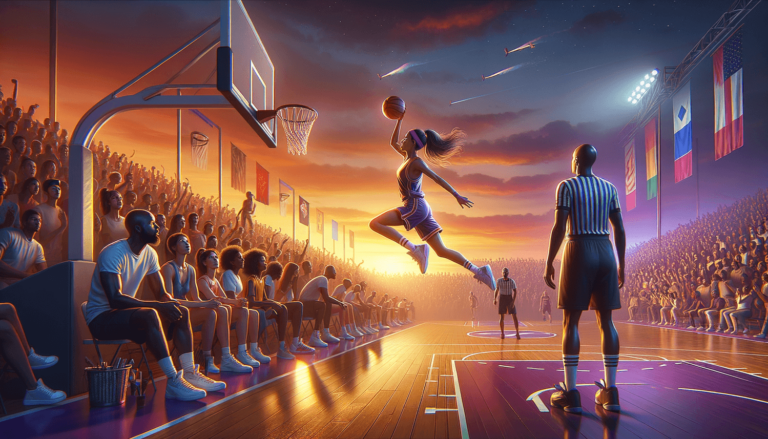
Influence of Fictional Basketball Characters on Pop Culture
Written by: Basketball Universe
Last updated:

From the boards of the court to the big screen, fictional basketball characters have been captivating audiences for decades. These larger-than-life characters dribble, pass, and score their way through TV shows, movies, and literature, leaving behind iconic catchphrases and memorable moments that embed themselves into the fabric of pop culture. Welcome to the thrilling and dynamic world of fictional basketball characters! In this blog post, we’ll dive into the immense impact these characters have had on our collective consciousness and explore how these hoop heroes have shaped, and continue to shape, the way we view and interact with the game of basketball. Let’s get ready to sink some game-changers into the net of pop culture history!
Influence of Fictional Basketball Characters on Pop Culture
Fictional basketball characters have influenced pop culture by becoming cultural icons and contributing to the widespread appeal of the sport. By showcasing incredible on-court action, demonstrating teamwork and sportsmanship, and presenting relatable underdog stories, these characters have inspired fans on and off the court. They also contribute to the growth of basketball as conversations surrounding these fictional players generate more interest in the game. Ultimately, fictional basketball characters bridge the gap between the realms of entertainment and sports, creating an influential impact on pop culture at large.
From Page to Court: Origins of Fictional Basketball Characters
Before we analyze the impact of these influential characters, let’s take a brief journey through some of the most iconic fictional basketball characters in entertainment. The journey began with novels, TV shows, and movies that introduced us to captivating stories revolving around the high-stakes world of basketball.
Slam Dunk: The Manga That Dunked It’s Way to Fame
Slam Dunk, a Japanese manga created by Takehiko Inoue, follows the story of a high school basketball team and their journey to become the nation’s best. Basketball history would be incomplete without acknowledging the global impact of Slam Dunk. With over 121 million copies sold worldwide, the series is a prime example of how fictional basketball characters can inspire basketball fans to new heights. Its protagonist, Hanamichi Sakuragi, is a perfect example of a player evolving his game, shifting from a troublemaking delinquent to a dedicated team player who falls in love with the sport.
Coach Carter: An Inspirational Bench Boss
Not all fictional basketball characters are players. Coach Ken Carter, portrayed by Samuel L. Jackson, is the embodiment of discipline and hard work in the 2005 film, Coach Carter. The movie tells the story of a high school basketball coach who places academics before sports and teaches his players the value of integrity and education. Coach Carter’s impact on pop culture proves that pivotal basketball characters don’t always have to be dribbling or shooting to make a statement.
Iconic On-Court Moments: The Art of Storytelling
It’s undeniable that fictional basketball characters are masters at capturing viewers’ hearts with their jaw-dropping plays, dramatic stories, and powerful life lessons. These characters can influence pop culture through the memorable moments they share, becoming household names synonymous with great storytelling.
Space Jam: When Fiction Meets Reality
Can you think of a more iconic fictional basketball moment than Michael Jordan joining forces with the Looney Tunes to defeat the evil Monstars in Space Jam? This 1996 film brought together legendary basketball players with the magic of animation, creating a memorable blend of fantasy and reality. The successful blend of real-life basketball legends with Bugs Bunny and his friends showed the world that basketball could be infused with humor and heart, leaving an indelible mark on pop culture.
White Men Can’t Jump: Breaking Stereotypes
Confronting stereotypes is another powerful way in which fictional basketball characters have left their mark on pop culture. 1992’s White Men Can’t Jump tells the story of two streetball hustlers, played by Wesley Snipes and Woody Harrelson, who join forces to win a series of games. The film addresses presumptions and prejudices on and off the court, showing characters overcoming the limitations they’ve imposed on each other. By addressing issues through basketball, these fictional characters create meaningful conversations surrounding pop culture, race, and society at large.
Fostering a Sense of Community
The influence of fictional basketball characters extends beyond the screen or page, promoting a sense of community and inspiring fans to become more involved in the sport.
One Tree Hill: A Tale of Brotherhood
The long-running TV series One Tree Hill followed two half-brothers, Nathan and Lucas Scott, who both share a passion for basketball. The show used their journey through school, college, and eventually professional basketball as a tool to navigate complex relationships and build a sense of community among fans. For many, One Tree Hill became more than just a show; it was an anchor that tied the sport to the everyday lives of viewers, promoting a shared bond for lovers of basketball.
Hoop Dreams: Encouraging Teens to Follow Their Passion
Films like the 1994 documentary, Hoop Dreams, shed light on the struggles that high school athletes face while pursuing their dreams of playing professional basketball. By capturing the real-life journeys of two African-American high schoolers from Chicago, the film made a significant impact on pop culture by showcasing the challenging yet transformative world of youth basketball. This portrayal encourages countless individuals to follow their passion, fostering a love for the sport that transcends beyond the screen.
Basketball Superheroes: Fictional Ballers Imparting Life Lessons
Fictional basketball characters often serve as role models, teaching invaluable life lessons to their devoted audience. From leadership to teamwork, these larger-than-life characters continue to shape the way fans perceive and engage with the sport.
Michael J. Fox in Teen Wolf: Embracing One’s Identity
In the 1985 film Teen Wolf, Michael J. Fox played a high school student who discovers he is a werewolf just as he’s trying to make it on the basketball team. The film showcases his character’s growth as he learns to handle his newfound abilities and accept his true identity. Teen Wolf inspired a generation of basketball lovers to embrace their unique qualities, proving that basketball can provide a platform for character growth and self-discovery.
Like Mike: Dreams Do Come True
When a kid acquires magical sneakers that give him unparalleled basketball skills, it ignites a whirlwind adventure in the 2002 film Like Mike. The movie, starring Lil Bow Wow, taught viewers that even if you don’t have magical shoes, hard work, dedication, and believing in yourself can take you far – on the court and in life. The character’s perseverance and commitment touch the hearts of both old and young viewers, showcasing the transformative power of the sport.
Boosting Popularity: Spurring Basketball Growth Worldwide
It’s unquestionable that the popularity of basketball has increased due to the global reach of these fictional basketball characters. They not only expand interest in the sport but challenge conventional narratives and bring new dimensions to the game.
Kuroko’s Basketball: A Worldwide Slam
Kuroko’s Basketball, a Japanese manga series and later anime, has played a substantial role in popularizing basketball in Japan and around the world. With a compelling storyline and strategic gameplay that keeps the audience hooked, this series has become a powerhouse in furthering the sport’s growth. The success of Kuroko’s Basketball shows that these fictional characters not only entertain but can inspire a wave of enthusiasm and investment in the sport from fans all over the world.
Generating Excitement: Basketball Video Games
From NBA 2K to NBA Jam, basketball video games have played a key role in boosting the sport’s popularity, while simultaneously turning countless gamers into basketball fans. These games often incorporate elements of pop culture, such as inclusions of fictional characters, that make the games more enjoyable and appealing to a wider audience. This feedback loop of interconnecting basketball and pop culture continuously feeds the sport’s global growth and influence among both casual and hardcore fans.
From their humble beginnings on the printed page to their slam-dunk performances on the big screen, fictional basketball characters have undoubtedly made a significant impact on pop culture. By merging the worlds of entertainment and sports, these iconic characters have become an integral part of basketball history. As these characters continue to inspire, entertain, and challenge us, their impact on the world of basketball and beyond will surely live on.
Creating Opportunities: Fostering the Growth of New Talent
As fictional basketball characters continue to embed themselves in pop culture, they’ve also contributed to the development and success of many talented actors and actresses. By creating new opportunities to showcase their skills, these characters have paved the way for more diverse representation on-screen and inspired further involvement in the sport off-screen.
Supporting Future Stars: Love & Basketball
One perfect example is the critically acclaimed film Love & Basketball, which gave actors Omar Epps and Sanaa Lathan a platform to showcase their talent by portraying two childhood friends who fall in love and strive for greatness in both basketball and life. This role not only shaped their careers, but also emphasized the importance of strong female characters in basketball-related narratives.
Discovering New Talent: High School Musical
While not strictly focused on basketball, Disney’s High School Musical played a role in promoting the sport to a younger audience. The journey of Zac Efron’s character, Troy Bolton, captivated millions of viewers, blending basketball with elements of romance, friendship, and self-discovery. Many talented actors and actresses, like Efron, have used these opportunities to jump-start their careers and demonstrate how these fictional characters can have long-lasting impacts on both their own lives and the lives of their fans.
Merchandising and Apparel: Wearing Your Heart on Your Sleeve
Pop culture’s influence on fictional basketball characters is evident in the wealth of merchandise and apparel that these characters inspire. By adorning our favorite team’s jerseys, quoting our beloved characters, and collecting related paraphernalia, we solidify their impact on our lives and contribute to the commercial success of the sport.
Michael Jordan and Nike: Into the Sneaker Stratosphere
The lasting influence of Michael Jordan’s character in Space Jam extends beyond the film, as it has long-lasting effects on global sneaker culture. In partnership with Nike, Jordan released exclusive Space Jam-themed Air Jordans that have swept the nation and expanded the conversation surrounding fictional basketball characters from the court to the streets. This collaboration highlights how these characters can generate significant popularity and shape consumer preferences in footwear and apparel.
Superfans: The Ultimate Collectors
With the market for collectibles being stronger than ever, fictional basketball characters have also found their way into the hearts of collectors. From action figures, posters, and trading cards to video game versions of popular basketball characters, these collectible items hold immense value and strengthen the bond between fans and the sport. The enthusiasm of these collectors further reinforces the unmistakable influence of these characters over both basketball and pop culture.
As the reach of fictional basketball characters stretches far and wide, their impact on pop culture continually deepens. Their effect goes beyond inspirational narratives and skillful gameplay, invading our everyday lives through opportunities for new talent, merchandising, and collectible items. It’s clear that these fictional hoop heroes hold a special place in the hearts of millions worldwide, solidifying their lasting impact on the pop culture landscape.
Frequently Asked Questions
If you’re curious to learn more about the influence of fictional basketball characters on pop culture or have some related questions in mind, we’ve got you covered! In this FAQ section, we’ve compiled 10 common questions and provided clear, concise answers, covering everything from the impact of these characters on real-life basketball to their presence in video games.
1. How do fictional basketball characters shape public perception of the sport?
Fictional basketball characters shape public perception by showcasing the excitement of the game, the importance of teamwork and sportsmanship, and by providing valuable life lessons through their stories. These captivating characters inspire both fans and players to engage with the sport in a passionate way.
2. How have fictional basketball characters contributed to the growth of the real-life sport?
Fictional characters have contributed to the sport’s growth by attracting wider audiences, sparking conversations about the game, and inspiring people to become more involved in playing or supporting basketball. From movies and TV shows to video games, these characters have immersed people globally in the world of basketball and amplified its popularity.
3. Do fictional basketball movies, shows, and books portray the sport accurately?
While some movies, shows, and books strive for accuracy in terms of gameplay, rules, and basketball culture, others may take creative liberties for the sake of storytelling, entertainment, or visual impact. Ultimately, the accuracy of these portrayals can vary depending on the intentions of the creators and the type of story they want to tell.
4. What role do racial and cultural representation play in fictional basketball characters?
Racial and cultural representation is vital for fostering a deeper connection between viewers and athletes in the diverse world of basketball. Fictional basketball characters can challenge stereotypes, empower underrepresented groups, and provide a platform for more nuanced conversations about race, culture, and identity in sports.
5. How do fictional basketball characters influence fashion and apparel?
Fictional basketball characters impact fashion and apparel by popularizing team jerseys, inspiring memorable collaborations (e.g., Michael Jordan and Nike’s Space Jam-themed Air Jordans), and creating a demand for basketball-related clothing and accessories. These trends not only represent fan devotion but also contribute to the commercial success of the sport.
6. How can fictional basketball stories inspire real-life players?
Real-life players can draw inspiration from fictional basketball characters by witnessing their dedication, perseverance, and teamwork, learning valuable skills and approaches to the game. Moreover, these characters embody the transformative power of sports, encouraging players to overcome obstacles and achieve their goals, on and off the court.
7. Why are some real-life basketball players included in fictional stories?
Real-life basketball players may be included in fictional stories to enhance credibility, generate excitement, and provide a touchpoint between these fictional worlds and the sport’s real-life action. Their presence can also add a unique element of surprise and novelty that captures the attention of fans and contributes to the story’s success in pop culture.
8. How have basketball video games influenced fictional basketball characters?
Basketball video games have inspired the creation of fictional basketball characters by introducing new narratives, creative game modes, and a unique blend of reality and fantasy. These games also create opportunities for fans to directly engage with their favorite basketball characters and utilize their skills within a virtual environment, further strengthening their connection to the sport.
9. How do fictional basketball characters motivate aspiring athletes?
Fictional characters motivate aspiring athletes through their own unique and relatable stories, showcasing how hard work, determination, and a strong support system can lead to success. The challenges faced by these characters resonate deeply, providing both inspiration and consolation during the highs and lows of an athlete’s journey.
10. Can fictional basketball characters change societal attitudes towards the sport?
Yes, fictional basketball characters can change societal attitudes by addressing important social issues, breaking stereotypes, and fostering conversations about inclusion, fair play, and teamwork. These characters can demonstrate the power of sports in shaping cultural values and fostering a more open-minded, connected community of fans and players.
Featured Posts
- No pillar pages found.
